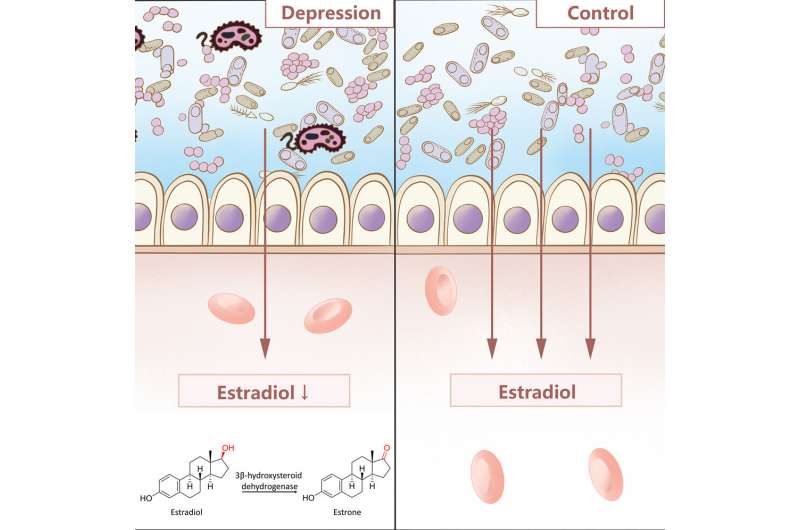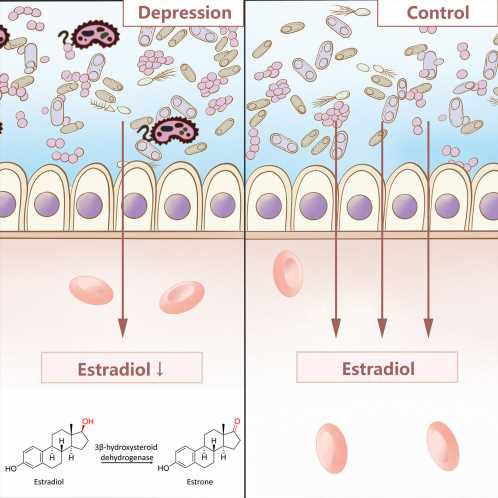
Researchers at Wuhan University in China have found a previously unknown mechanism linking gut bacteria, estradiol, and depression in women. The study, “Gut-microbiome-expressed 3b-hydroxysteroid dehydrogenase degrades estradiol and is linked to depression in premenopausal females,” is published in the journal Cell Metabolism.
Previous research has determined that healthy moods or depression can be associated with estradiol levels. Estradiol is the primary form of estrogen during reproductive years. Premenopausal women with depression have been observed with lower levels of estradiol but the cause of the correlation has not been understood.
The current investigation was initiated by observing that estradiol levels in the blood of premenopausal women with depression were around 43% lower. Estradiol enters the gut following liver metabolism and is then partly reabsorbed back into the blood. So researchers followed the path from the low blood samples, back to the gut.
Gut microbiota samples were collected from premenopausal women with and without depression. Tests showed that within 2 hours, estradiol degraded by 77.8% in the guts of women with depression and by only 19.3% in the non-depression group. The result hinted that even if both groups were capable of producing estradiol at healthy levels, something was causing or accelerating the breakdown of estradiol in the microbiome environment.
The researchers introduced the depressed sample microbiome to mice and found a 25% decrease in estradiol levels in the blood vs. a control group. Behavior experiments observed depression-like behaviors in the mice with lower estradiol levels. The results suggested that gut microbiota from premenopausal women with depression can reduce serum estradiol in mice and induce depression-like behaviors, mimicking what was observed in humans.
With a clear indication that some element of the microbiome was involved, the team went looking for the source of the problem. To isolate a potential gut microbe that might be degrading the estradiol, they plated lab dishes with estradiol as the only carbon source and introduced the gut microbiota of the depression group. A pale white colony with fuzzy edges and a smooth surface emerged on the plate. A single microbe was isolated and identified as Klebsiella aerogenes.
K. aerogenes was tested in isolation with estradiol. After incubating for five days, researchers discovered that 61.8% of estradiol had been converted into estrone. With a suspected mechanism in hand, researchers decided to retest the mice with the isolated microbe.
This time researchers used three groups of mice, a control, one inoculated with K. aerogenes and a third group, also inoculated with the microbe but given an additional antibiotic to see if the activity would be deterred. The results confirmed that K. aerogenes alone reduced the estradiol levels in mice and induced depressive-like behaviors. Additionally, the antibiotic cefotaxime alleviated depressive-like behaviors in mice. With a good idea of what was causing the estradiol drop in patients, the research team moved on to how.
Whole genome sequencing was performed on K. aerogenes. Using a combination of databases, KEGG for molecular interactions and GenBank for genome reference, the team identified 3β-HSD, an enzyme produced by the microbe capable of degrading estradiol into estrone.
Researchers returned to the mice to confirm that the enzyme in question functioned as expected. E. coli with an inserted gene to produce 3β-HSD was introduced to the mice. Again they saw estradiol levels drop (45%) and depression-like mouse activity. An additional leg of the experiment increased estrone levels in mice to check for an effect of the reduced form alone, but none was found.
Finally, the prevalence of K. aerogenes and 3β-HSD was found to be higher in the microbiomes of premenopausal women with depression compared to those without. The researchers suggest that the estradiol degrading bacteria and 3β-HSD enzymes may be potential intervention targets for depression in premenopausal women.
More information:
Di Li et al, Gut-microbiome-expressed 3β-hydroxysteroid dehydrogenase degrades estradiol and is linked to depression in premenopausal females, Cell Metabolism (2023). DOI: 10.1016/j.cmet.2023.02.017
Journal information:
Cell Metabolism
Source: Read Full Article
